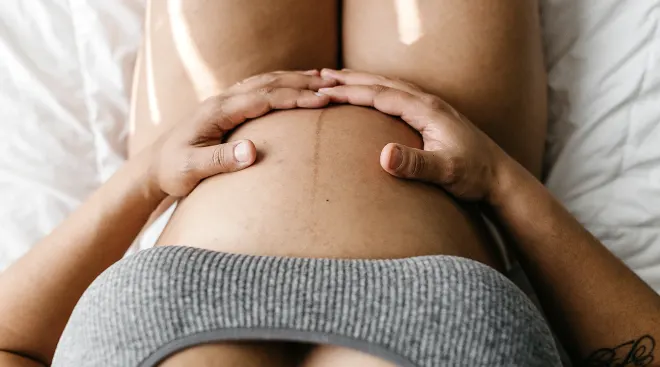What Is Tokophobia? How to Cope With the Extreme Fear of Childbirth
Having a baby comes with many different emotions. You might be filled with excitement, happiness, anxiety, fear—or all of the above. And when it comes to delivery—whether it’s vaginal birth or c-section—just thinking about what may happen can be overwhelming, even if you’ve already experienced childbirth.
It’s common for expectant parents to be nervous throughout pregnancy and as labor approaches. But if your fear is so intense that it begins to rule your life, you could have a condition known as tokophobia. Read ahead for what you need to know about the fear of pregnancy and childbirth, including what causes tokophobia and tips for overcoming it.
Tokophobia is an intense fear of childbirth, according to the Cleveland Clinic. Sogand Ghassemi, MD, a child, adolescent and adult psychiatrist and chief of medical staff for PrairieCare, says this fear can be centered on something potentially going wrong during childbirth, worries about the health and safety of the baby, concern around pain or a general anxiety about lack of control.
“Tokophobia is characterized as a phobia stemming from an anxiety disorder that involves an intense, irrational and persistent fear of childbirth that significantly impacts a person’s life and well-being,” says Ghassemi. While acknowledging common anxieties can help pregnant people’s well-being, “if the fear doesn’t subside with reassurance, becomes more intense and affects day-to-day functioning,” it could be tokophobia, she says.
This fear of childbirth can be so strong that those who have the condition (and want to expand their family) might avoid getting pregnant altogether, according to the Cleveland Clinic.
“It’s typically a severe, disabling, debilitating and pathological fear,” says Michael Krychman, MDCM, an ob-gyn and vice president of medical affairs at HerMD.
The rate of tokophobia among the population is hard to pinpoint since there are different ways of defining it in research studies. According to one study of 191 pregnant women, as many as 75 percent of the participants “reported low to moderate tokophobia,” while 25 percent showed “high or very high fear of childbirth.” But only 1.6 percent of the participants exhibited “pathological fear.” One systematic review notes that the definition of tokophobia varies from study to study, and that prevalence rates range anywhere between 3.7 percent and 43 percent—but estimates the overall worldwide prevalence at 14 percent.
Is It Tokophobia or Anxiety?
Ferdinando Palumbo, MSW, LCSW, a clinical social worker and therapist who specializes in anxiety disorders and owner of Northern NJ CBT, explains that for a condition to be considered a diagnosable phobia, the fear has to be “disproportionate to the actual risk posed by the stimulus” and impair someone’s ability to function.
So if you’re pregnant or considering having a baby and the idea of childbirth scares you, you don’t necessarily have tokophobia. “This could be a normal and even healthy concern,” says Palumbo. “A healthy level of concern can guide us to finding a good ob-gyn, a supportive doula, a reputable hospital or other useful things. However, if someone was ruminating about how much pain they’ll experience, and that rumination is interfering with their life and causing them distress, that could be tokophobia.”
There are two types of tokophobia, according to the Cleveland Clinic:
- Primary tokophobia occurs in people who have never been pregnant.
- Secondary tokophobia can develop due to a previous traumatic event during birth or labor.
Tokophobia can be caused by a variety of factors, including past traumatic experiences; a history of anxiety, depression or other mental conditions; and other phobias, including fear of pain and fear of dying. “Some individuals may have a specific fear of the pain associated with childbirth or a fear of losing control over their bodies during the process,” explains Ghassemi. Some experts link a past history of sexual abuse with tokophobia. “Individuals who have experienced sexual trauma may develop a fear of childbirth due to associations between birth and their past trauma,” Ghassemi says.
Symptoms of tokophobia can include the following, according to Ghassemi:
- Intense anxiety or panic attacks when thinking about pregnancy or childbirth
- Avoiding pregnancy, or “extreme distress at the thought of becoming pregnant”
- Having intrusive thoughts or nightmares related to childbirth
- Physical symptoms of anxiety, such as rapid heartbeat, sweating or trembling
- Difficulty concentrating or functioning due to a preoccupation with the fear of childbirth
Tokophobia can also negatively affect your sex life, says Krychman. “If [you’re] fearful of getting pregnant, it can be very impactful,” he adds. “You may choose to avoid intimacy and eliminate sexual intercourse from your repertoire, thus completely eliminating the possibility of pregnancy.”
Palumbo says that some people go to extreme measures to avoid sex and pregnancy. “They may avoid dating or sex, check and recheck prophylactics to make sure pregnancy won’t occur, or purchase pregnancy tests when they have no real reason to suspect they’re pregnant,” he says.
There’s also a link between tokophobia and increased chance of an elective c-section, notes Krychman. One systematic review found that “one of the primary reasons behind women’s desire to give birth through a caesarean delivery was the pathological fear associated with the labor process.”
When considering a treatment for tokophobia, therapy is a good place to start. “Cognitive-behavioral therapy, or CBT, can be effective in helping individuals with tokophobia challenge and reframe their fears, develop coping strategies and manage anxiety symptoms,” says Ghassemi.
Palumbo adds exposure therapy is the “gold standard” treatment for any phobia. “For a person with tokophobia, this could entail picturing herself as pregnant or becoming pregnant or watching videos of pregnant women,” he explains. Ghassemi says that this treatment can be “used gradually to desensitize the individual to their fears.”
In some cases, medication such as antidepressants or anti-anxiety drugs can be helpful in reducing symptoms of tokophobia. “Medication may be prescribed to manage severe anxiety symptoms or underlying mental health conditions,” says Ghassemi. “These can include [selective serotonin reuptake inhibitors (SSRIs), serotonin-norepinephrine reuptake inhibitors (SNRIs)] and anxiolytic medications,” which are medications prescribed for anxiety. She adds that it’s important to make this decision with the help of your psychiatrist.
If you’re experiencing fear of pregnancy and childbirth, there are many coping techniques that can help, including:
- Educate yourself. “Learn about the pregnancy and childbirth process to address any misconceptions, and gain a better understanding of what to expect,” says Ghassemi. Krychman also recommends attending pregnancy and newborn classes.
- Make sure you have a strong support network. “Creating a strong support network to help you through pregnancy, childbirth and the postpartum period” can go a long way, says Mary Jacobson, MD, an ob-gyn and chief medical officer of Hello Alpha. Krychman suggests joining a support group of people with similar fears.
- Have a birth plan—but stay flexible. Making a plan with your provider could help alleviate some anxiety, but make sure to allow some flexibility, says Jacobson. “Don’t let adherence to a birth plan cloud your judgment,” she says. “Remember that your obstetrician, midwife or other birthing attendant and nursing staff want the best outcome for you and baby.”
- Consider hypnotherapy (or HypnoBirthing). Krychman suggests this method, which could help you feel more relaxed during the birth experience.
- Practice relaxation techniques. Krychman recommends yoga, mindfulness and meditation to help ease your mind.
- Do more of what you love. “Prioritize self-care activities that promote mental and emotional well-being, such as exercise, hobbies and engaging in activities that bring you joy,” says Ghassemi.
Most importantly, don’t minimize your own concerns—and make sure to reach out to your provider or a mental health specialist if you’re experiencing fear around pregnancy and childbirth. “It’s important to emphasize that tokophobia is a valid and significant concern that should be taken seriously,” says Ghassemi. “It can impact a person’s decision to have children or affect their overall mental health during pregnancy.” But the good news is that with the appropriate support and treatment, you can manage your fears and have a positive pregnancy and childbirth experience.
Please note: The Bump and the materials and information it contains are not intended to, and do not constitute, medical or other health advice or diagnosis and should not be used as such. You should always consult with a qualified physician or health professional about your specific circumstances.
Plus, more from The Bump:
Sogand Ghassemi, MD, is a child, adolescent and adult psychiatrist and chief of medical staff for PrairieCare, a mental health services provider in Minnesota. She earned her medical degree from the University of Illinois at Chicago College of Medicine.
Mary Jacobson, MD, is an ob-gyn and minimally invasive surgeon in Palo Alto, California. She is also chief medical officer of Hello Alpha. She earned her medical degree from Georgetown University School of Medicine.
Michael Krychman, MDCM, is an ob-gyn and vice president of medical affairs at HerMD. He earned his medical degree from McGill University Faculty of Medicine and Health Sciences in Montreal.
Ferdinando Palumbo, MSW, LCSW, is a clinical social worker and therapist who specializes in anxiety disorders. He is the owner and director of Northern NJ CBT.
Cleveland Clinic, Tokophobia (Fear of Childbirth), April 2022
Journal of Perinatal Medicine, Tokophobia (Fear of Childbirth): Prevalence and Risk Factors, April 2017
Acta Obstetricia et Gynecologica Scandinavica, Worldwide Prevalence of Tocophobia in Pregnant Women: Systematic Review and Meta-Analysis , March 2017
Learn how we ensure the accuracy of our content through our editorial and medical review process.
Navigate forward to interact with the calendar and select a date. Press the question mark key to get the keyboard shortcuts for changing dates.




















































